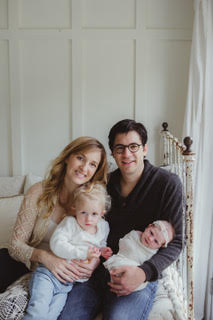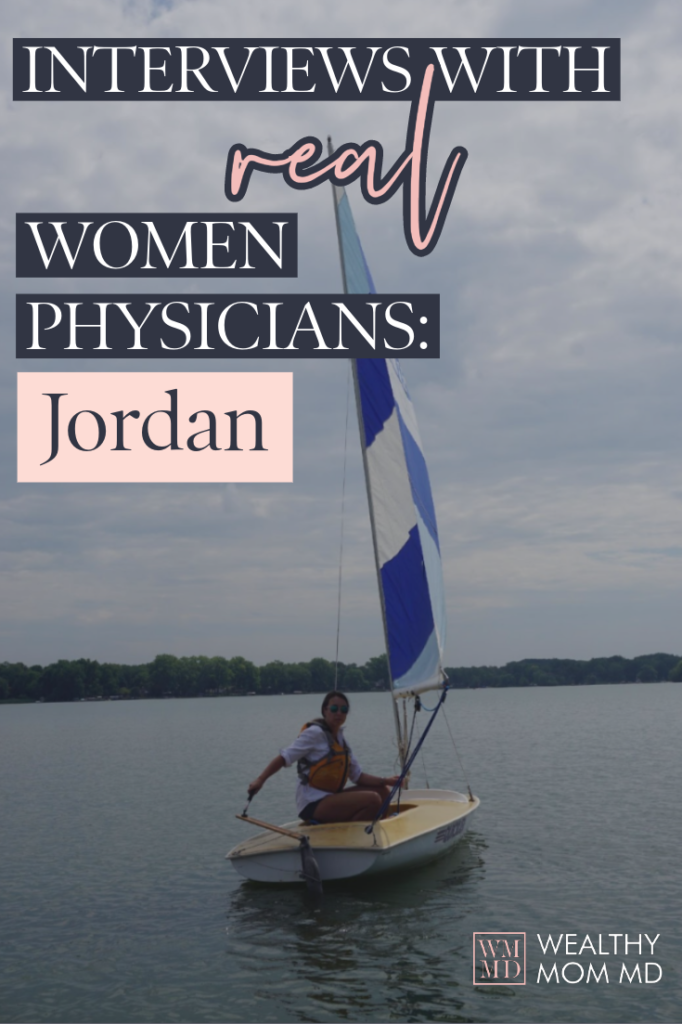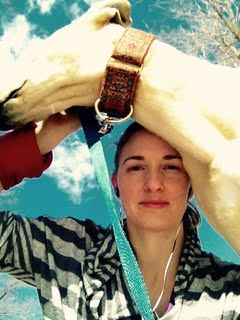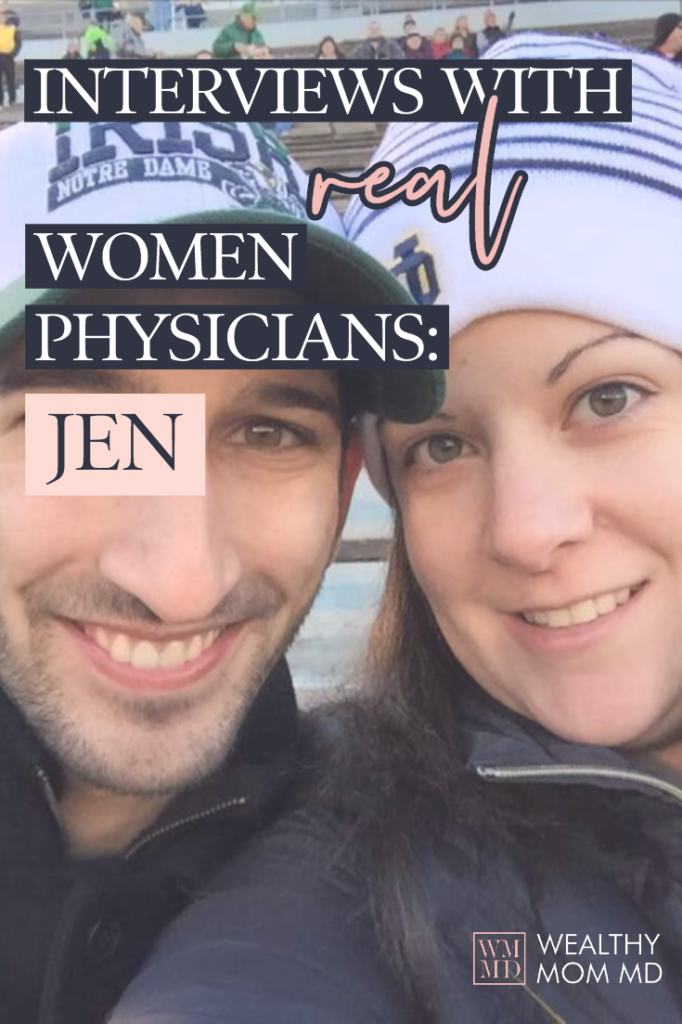Interviews
Welcome to another installment of Interviews with Real Female Physicians. The goal of this series is to share their story so that you, the reader, may learn and be inspired by their experiences – good and bad. We all come from different backgrounds and have different situations. Some of you are married, some are not, some with kids, some with blended families. Let’s show other women that any of these can work financially!
Tell us about yourself:
Hey there! My name is M and I blog over at Reflections of a Millennial Doctor. I am a happily married 32-year-old DINK (dual income, no kids) working as a Primary Care Internal Medicine-Pediatrics (aka Med-Peds) doctor in the Pacific Northwest, somewhere between Seattle and California’s insane costs of living.
I grew up in Toronto, Canada to Filipino immigrant parents and moved to the Midwest in high school, where I stayed for university, med school and residency. Upon completion of training, I moved out the Pacific Northwest for my first real doctor job, but really it was in chase of mountains, dark craft beer and coffee.
It’s funny how one’s perspective changes over the course of the year – on my blog I write ad nauseum about my journey with burnout and disenchantment with medicine. However, I am to the point now where I’ve realized I still love medicine. I love the puzzle of it, the lifelong learning, the privilege of being able to provide reassurance in people’s darkest moments. What I hate is the business of medicine, the machine it has become.
With that being said – would I choose my specialty again? Yes, I love Med-Peds. If I had it in me to go further, I probably would have done Pediatric Hematology-Oncology and perhaps focused on adult survivorship of childhood cancers, so it would still be within the Med-Peds realm.
If there was just one piece of advice I could give to med students, it would be this: Remember you’re eventually going to return to your life once you’re done with med school and residency training. Make sure you take the time to cultivate that part of you so you actually have something to return to – medicine will happily take everything you have to give if you let it.
Did you graduate with student loans?
I didn’t have loans from undergrad due to scholarships and the generosity of my parents, however, I financed my entire med school education with student loans, graduating with $217,000 at 6.8% interest.
I went to in-state public universities for both undergrad and med school. I also lived at home for all of pre-med and my 2nd and 3rd years of med school, so I consider these as giving myself my own scholarships!

How fast (or not) are you paying them off and how are you paying them off?
I started paying on my student loans in residency – at that time we were putting down $1,500/month and it still didn’t touch the principal! By the time I was done with residency, despite the money we had been putting toward the loans, it had ballooned up to $250,000.
In December after I first started my attending job and replenished our emergency fund, I got serious about paying down my student loans. I didn’t want to be beholden to PSLF in case it went away before my loans were done, and I knew I could pay these off within 5 years.
I researched all of the student loan refinancing options out there and settled on Earnest as it gave me the lowest interest rate at 5% and allowed me to make bi-weekly payments of $2,500. Plus, you can refinance every 6 months, thus I’ve refinanced twice since then:
- Once I hit below $200,000, fixed interest rate lowered to 3.38%
- Once I hit below $140,000, I decided to do a variable loan and got the % down to 2.72% which has since gone up to 2.97%
I am currently debating whether or not I should refinance again back to a fixed APR since interest rates will continue to rise, but I may just use this as more incentive to pay off the last $96,000 sooner.
All in all, I plan on being done with my student loans one year sooner than my initial goal of 5 years.
Financial aspects of kids
We don’t have children, but my husband and I have talked extensively about what we would do if we chose to have kids. My husband would likely quit his job and be a stay at home parent. I would also likely cut back for a time. Being free of my student loans will allow me to do this – another great reason to pay them off sooner.
We are strong believers in public school as we both are products of that system and it’s served us well. Public university is still expensive though, so we’d definitely want to start up 529s.
Financial aspects of marriage
I’m married to J who I’ve been with for almost 15 years – nearly half our lives together which is mind-boggling to think about! We did not get a pre-nup, and quite honestly, it never came up prior to our wedding 8 years ago. It may be naive to think we’d split amicably enough, but I’ve never regretted not having a pre-nuptial agreement.
J and I both remember working minimum wage jobs while we were teens and scouring the $1.97 clearance racks at Old Navy looking for deals on date nights at the mall – we’ve moved a little beyond that now, but not by much. Since we’ve essentially grown into adulthood with each other, we’ve adopted the same minimalist mindset and financial practices. Any purchase above $100 other than groceries merits a discussion, and we (usually just me) hem and haw about things for several months before we (I) commit.
Though I am the breadwinner now, all through med school and residency J filled that role. I can honestly say it hasn’t changed anything in our relationship. Unfortunately, we’ve seen relationships have power dynamics shifts in the home based on money, and that’s not something we’d ever want to emulate. We are of the mindset that if we’re both aiming to improve our home lives then our contributions are equally valued, whether they’re monetary in nature or acts of service.
Financial mistakes:
What financial mistakes have you made?
My biggest financial mistake by far was moving from the Midwest to the West Coast. For comparison, just before residency, we were able to buy a little house for $112,000, albeit at the lowest point of the housing market crash – absolutely unheard of when looking at housing on either coast! If I had stayed in the Midwest, I absolutely would have been done paying off my student loans by now and would probably be able to retire by the time I’m 40.
Do I regret it? Absolutely not.
Moving out to the Pacific Northwest has been like walking into an enchanted forest with mountains and fuzzy trees. I’ve discovered a love of the outdoors I didn’t know I had and reclaimed a passion for photography I thought I’d lost (which I’m documenting on Instagram as a wannabe photographer). I’m 100% the fittest I’ve ever been from all the hiking and running I’ve done out here PLUS I have all the craft beer I could ever want at my disposal.
Maybe this is the millennial in me talking, but if this is the fee I have to pay for #livingmybestlife, so be it.

General Finances
What’s your FI (financial independence) number?
This has been a fluctuating number for me – initially, I had told The Physician Philosopher $4 million, but after looking at it from the lens of pure FI vs our retirement number, I have adjusted my projected FI number to $2 million. This is based on anticipating yearly spending at $80,00 which is quite generous and much more than we’re living on currently, but we anticipate increasing our travel, food/dining budget and possibly throwing in a small human in there.
Assuming I would shuttle the $65,000 I’m putting toward student loans directly into retirement funds after the loans are paid off, I should hit my FI number in less than 10 years. At that point, I would definitely cut back on work.
I would be more comfortable with $3 million for retirement and would likely work until I get to that number.
Who handles the finances in your relationship? Do you DIY or do you have a financial advisor?
I definitely take the more active role in handling finances, but as stated above, pretty much all financial decisions above $100 are discussed. We currently DIY though I do use Wealthfront (a roboadvisor) for my rolled over 401k, Roth IRA and taxable account.
What is your net worth?
Our net worth is $350,000+. This is definitely augmented by our home equity – we bought a foreclosure in the Pacific Northwest which has increased in market value over the last 3 years.
How are you saving for FI/retirement?
As a rule, I’ve maxed out all my tax-deferrable investments. I am using my work’s 401k which is a Vanguard Target Retirement Fund. All of my past 403b’s and 401k’s have been rolled into a Rollover IRA, and past Roth IRAs have been rolled into Wealthfront as well. With Wealthfront, you can max out your risk tolerance settings and the portfolio’s target allocation is adjusted accordingly (stocks > bonds). The majority of the investments are in Vanguard and iShares ETFs/stocks. This is automatically rebalanced when Wealthfront invests the dividends and new automatically transferred funds.
I also have an HSA which I have been maxing out for several years as well and am investing via Lively HSA (which has no minimum requirement before you can invest) via TD Ameritrade, which offers commission-free ETF’s. I manually try to rebalance every time I invest the new funds.
I will be moving into a new job next year that will also open up a private 457b option, which I fully plan on maxing out.
Once my student loans are paid off, I’ll have to figure out where that money will go – likely will be a taxable account.
Biggest financial failure/regret:
I quite honestly don’t have one. I am so incredibly grateful to have had good intentional financial habits from early on. I credit my father for this, as well as having had a job since I was 13. I knew the value of a hard-earned dollar and just how quickly that could disappear on just one item.

Do you have insurance?
I have own-occupation disability insurance but no life insurance or umbrella. The lack of umbrella insurance is such an oversight on my end, and one I will have to remedy ASAP. As for life insurance, we really haven’t felt the need to get that now as my loans would be discharged upon my untimely death, and my husband can support himself. This will need to be addressed in the future.
Do you give to charity?
I volunteer at a free clinic, donate to a couple of charities close to my heart (The Potocki-Lupski Syndrome Foundation and The International Rescue Committee) and always max out my employer’s matched contributions to charity.
This year, in honour of a close friend of mine who was diagnosed with stage 4 colon cancer at the young age of 34, I’ve donated to PALTOWN which oversees Colontown, an amazing group that focuses on patient empowerment and education. I am also currently helping support a cousin of mine through university, so between all of that, it comes up to a tidy sum.
Any parting words of wisdom?
Financial independence is great and all, but sometimes the pursuit of FI distracts from what is most important: a life well-lived.
I often think of Bronnie Ware’s 5 Top Regrets of the Dying:
- I wish I’d had the courage to live a life true to myself, not the life others expected of me.
- I wish I hadn’t worked so hard.
- I wish I’d had the courage to express my feelings.
- I wish I had stayed in touch with my friends.
- I wish that I had let myself be happier.
All the money in the world won’t shield us from these regrets. It is up to us to continue living intentionally and with connection – to ourselves and to others.
Tell readers a fun/random fact about you:
In a past life, my side gig was to play the piano at wedding ceremonies and receptions. I’ve always fantasized about having a baby grand piano, but alas, that would never fit in the tiny house of my dreams.
And finally, where can people connect with you?
I’m apparently everywhere on the internet!
Blog: Reflections of a Millennial Doctor
Instagram: Millennial Doctor – This is definitely where I’m the most active and post daily pictures of my photography and hiking adventures.
Twitter: @Millennial_Doc
Facebook: Reflections of a Millennial Doctor
E-mail: [email protected]
Read MoreWelcome to another installment of Interviews with Real Female Physicians. The goal of this series is to share their story so that you, the reader, may learn and be inspired by their experiences – good and bad. We all come from different backgrounds and have different situations. Some of you are married, some are not, some with kids, some with blended families. Let’s show other women that any of these can work financially!
Tell us about yourself:
I am an internist at an academic center doing primary care and hospital work; traditional internal medicine. I am married with a grown step-son; he moved out a few years ago, so we are empty nesters. Hobbies include reading (fiction, and personal finance blogs), learning languages on Duolingo, and traveling. Work has taken over a lot of my free time and I am trying to reclaim some of that time to pick up hobbies I used to do in the past.
I live in what used to be a lower cost of living city. It’s become more expensive, so I might live in a medium cost of living city at this point.
I originally picked Internal Medicine because I wanted the option to specialize, and as one of the fellows I worked with suggested, I was going to be happier in a field with more thinking and opportunities to diagnose. As it turns out, staying in primary care/IM has been great for me. I loved my continuity clinic as a resident because I liked building a relationship with my patients, and I’m happy as an attending to get to know my patients over time. It’s great when they refer friends and family members. I also love having a variety of medical problems to deal with every day: diabetes, and hypertension, and migraines, and birth control, and GI issues. I think I would get bored seeing the same thing every day. I have fun figuring out my patient's problems and am also happy that I have the option to refer out if I hit a wall.
For medical students, I’ll repeat two pieces of advice I heard when I was an anxious, undecided student. One, pick a field with the body fluid that grosses you out the least. Two, you figure out in the OR pretty quickly if you have what it takes to do surgery. This won’t narrow down your choices to just one specialty but it will knock out a lot of specialties for you.
If you are asking for financial advice, I would say that internal medicine/primary care can be lucrative if you are willing to work hard. Nevertheless, you won’t make as much money as some specialties. I was fortunate enough not to graduate with crushing medical school debt. If you have a lot of debt, you’ll have to work hard AND live like a resident AND maybe practice geo-arbitrage or arrange for loan forgiveness for a few years to get ahead.
Did you graduate with student loans?
I did not go straight through to medical school. I had gone to graduate school, and had an NIH grant, which I had to pay back in time or money. That loan had high interest (I think about 8%), and I took forever to pay it off. I was able to discharge most of it (7/8ths) with service (teaching), and finally paid it off my first year as an attending. In the end, I paid only $5800 in cash, which now seems minimal, but was a huge looming burden at the time.
I was lucky enough not to owe money for my medical training, as I had some family support. They paid tuition and I paid my living expenses. I did have some money I had earned between graduate school and medical school, and some stock investments did well.
Financial aspects of kids
When did you have them?
No biological children for me, just the step-son. We actually picked our wedding date so he could attend our wedding before he left for college—he left the next week!
Are you planning to fund their college expenses?
My husband and I didn’t date for a very long time before getting married, so I didn’t have long to prepare for dealing with college expenses. Luckily, other members of my husband’s family pitched in to help with college, but we ended up paying for room and board for four years. After the support I had received from my family, I felt an obligation to pay it forward. My step-son was able to graduate without student loans, which I feel is a huge advantage we were able to give him.
I am putting money in 529s for my nieces and nephews. I don’t expect it will be sufficient to cover college costs, but there will hopefully be enough for a nice “Aunt and Uncle Scholarship.”
Financial aspects of marriage
Are you married? Are you divorced? Remarried?
Married
Did you get a pre-nuptial or post-nuptial agreement?
We did get a pre-nuptial agreement, as we did not date for a very long time before getting married. It was mostly in case the marriage fell apart really quickly. I don’t remember what it says anymore.
Do you and your partner agree on finances?
We feel we mostly agree on finances. When I first discovered the personal finance blogs—especially Mr. Money Moustache and Frugalwoods—I sometimes would ask too many questions about grocery shopping and utility bills and annoy my husband. Ultimately, I want to retire on a higher budget than he does, so I think if you were to ask each of us what our “retirement number” is, we’d give different numbers.
Does your spouse stay at home?
After a few years of marriage, we realized that my husband could save us a lot more money by managing the household than he was earning at his job. He was willing to do this, but he had some issues to work through once he was staying home. It was hard for him not to be bringing in cash every week. Over the years, I think he has been more satisfied with this arrangement—he can really see the financial benefits, and he also has more time available to pursue other projects.
Are you the breadwinner?
I am the breadwinner. It was stressful for me at first to realize I was now responsible for 2 people (3, if you count my step-son when he was in college.) I am afraid that it enforced my bossy personality. Fortunately, my husband has a strong sense of self and doesn’t let me run him over.

Financial mistakes:
Have you made any financial mistakes?
There have been lots of things that I probably could have done better: not buying a house in residency, spending less on clothes and house stuff when I first got my attending salary, saving more (especially while I was single). This was long before blogs, especially doctor-oriented blogs, were a thing. In the end, I would chalk some of it—like the house and the overbuying—as a learning experience, since the overall financial impact wasn’t that much. I wish had had access to modern advice on saving as a new attending, as I was ready to save, but wasn’t sure how much was reasonable.
General Finances
What’s your FI (financial independence) number?
I haven’t yet decided on my final FI number. I’m thinking about 25x expenses, but there’s still a while to go until I get there. I expect that once I get closer, I’ll want more padding and a bigger number before I quit work altogether.
I’m thinking more about slowing down and sliding into retirement, rather than going full force and then quitting suddenly. I had planned to wait until the mortgage was paid off before reducing my hours, but this spring I decided I couldn’t wait that long. I cut my hours by just a tiny bit this year and will see how this goes, both financially and in terms of improving my work-life balance.
Who handles the finances in your relationship? Do you DIY or do you have a financial advisor?
I handle the finances in the relationship for the most part, as I had been doing it for several years as an attending before meeting my husband. Now that I’m married, I do discuss what I’m doing with him. Most things are DIY, though we do have an accountant who does our taxes, and I have a broker for investments. He’s my dad’s broker too—my dad and I often discuss whether we’re getting good advice, but are staying with him until he retires.
What is your net worth?
With the market gymnastics recently, I can’t be quite sure. Including the Zillow estimate of our home’s value (about which I have some reservations), I would estimate our net worth at about 18X our annual spending.
How are you saving for FI/retirement?
Maxing out my 403(b). Back-door Roth IRA for me. Still working on my husband to start a spousal back-door Roth for him. I have a taxable account which mostly has stocks, some of which I have had for decades.
My 403(b) is in a target-date fund. Roth is in individual stocks. I haven’t really bought bonds (except in the target date fund), but have been aggressively paying down the mortgage—which I think as sort of like investing in bonds (not as high returns, but more certain returns than stocks). Once I finish paying off the house, I will have to think about bonds more seriously.
Biggest financial failure/regret:
Had I gone to med school earlier, I imagine I could be a lot further along on my path to financial independence. But I don’t know that I begrudge the time I had to do other things, and mature.
My biggest real regret is not learning to bill properly. Now that I know how to do that, I realize I probably undercoded by $25,000 to $30,000 a year in my first years as an attending.
One thing you wish you knew:
How to read a prospectus critically.
Do you have insurance?
Life insurance through work. Disability through work, and I also have a small policy I continued from residency; it wouldn’t cover all our current monthly needs, but would be a big help. Yes to umbrella insurance.
Do you give to charity?
Absolutely. I give about $3500 a year to various charities—mostly the local food bank, but also to my university, and small amounts to various groups I want to support. I can take tax deductions for some memberships (museums, religious institution), but these don’t really feel like charity since I’m getting something back for that money.
Any parting words of wisdom?
Paying yourself first and automating savings are some of the most important things you can do for your finances. Assuming you make an effort to live on your income without going into debt, putting away 10 to 20% of every paycheck will make you rich, sooner than you think. You’ll get richer faster if you invest that money wisely.
"Paying yourself first and automating savings are some of the most important things you can do for your finances." Click To TweetTell readers a fun/random fact about you:
In my 20s, I spent a summer driving across the country and back on my own, before smartphones. With a non-working car stereo. I grew a lot that summer.
Where can people connect with you?
I started a blog this year (inspired by Wealthy Mom MD and several other women bloggers). I’m still learning about blogging, but it’s been fun to write something other than progress notes.
Read MoreWelcome to another installment of Interviews with Real Female Physicians. The goal of this series is to share their story so that you, the reader, may learn and be inspired by their experiences – good and bad. We all come from different backgrounds and have different situations. Some of you are married, some are not, some with kids, some with blended families. Let’s show other women that any of these can work financially!
Tell us about yourself:
I’m a 41-year-old Emergency Medicine Physician and have been practicing for 10 years. I graduated with a liberal arts degree and worked in consulting for a few years before deciding to go to medical school. I think that was the best thing ever because people often go straight through with tunnel vision and then awaken and wonder if the grass is greener on the other side. I took a few years to work in corporate America and actually had a great couple of years traveling between Chicago and Southern California, staying in a corporate apartment in Newport Beach, driving a rented convertible to work and expensing meals while pretending to work. But in my spare time, I was taking lunch breaks to try out for game shows in LA and didn’t find fulfillment in what I was doing day to day and decided to apply to medical school since I happened to take my premed classes to appease my parents during college. I never made it big in Hollywood (I didn’t even make it past round one of any audition) and then the dot-com bubble burst and I got accepted to medical school and traded in my airline miles and heels for books and clogs.
After residency with 2 kids in tow, I decided to move to a big city in Texas temporarily to be near family. It was supposed to be a short stint until the kids were a little older and then we would move to some beautiful city near the beach, maybe out West… But the reality is money goes further in Texas, especially for Emergency Medicine (this is changing now) and it was great to have grandparents nearby to help on the weekend and when our schedules get complicated. Somehow 10 years have passed and I’m still in the muggy, misquote town and now it's hard to uproot the kids and move and not worry about years of therapy later.
Do I like EM? Would I do it again? Well I can’t imagine what else I would do in medicine because I’m constantly interested in something for a short amount of time and thinking of the next big thing. I have attachment issues and don’t want to see the same patient again and I don’t like to work when I’m not at work. I like to stack my shifts and jump on a plane and explore a new country in my spare time and I like most EM docs I’ve met. This probably makes EM a pretty good fit for my style but I think of it as a continuum and I’m always thinking of what may come next. I am working on being a writer but I hate grammar. I wanted to be an actress but I don’t have emotional range. I want to be a rockstar but I don’t have rhythm. But I am always daydreaming of what I’m going to do next with my life and just see EM as a step in the journey. I can’t wait to see what happens next…

Did you graduate with student loans?
I went to an expensive undergraduate (Northwestern) and left with student loans. Not as much as you would think because I got some scholarships and also I’m from a poor family so I got aid. I did work study and worked a few years after and paid some of the loans back, not all.
I rolled the rest of my undergraduate loans into my medical school loans. I got a scholarship that covered some part of my medical school tuition and finished with about 80K in total debt (between undergrad/med/residency) which could have been a lot smaller if I hadn’t deferred payment in residency. I was just a lemming like all the others around me and didn’t take the brain space to question financial decisions at the time, instead, I just did what the mob did and racked up interest. I wish I had the brainpower to spare during med school/residency/early mommy hood to look at my finances and start paying back the loans because I could have saved some money. The interest on my loans is small, something like 2 % so for years I was just paying the monthy payments, spread over 30 years. Then I started making big payments every so often when I would think about finances, then I just decided to pay them off and it feels so good to be without any educational loans. My husband had about 40K of loans from undergrad and paid them off a few years before me so we are both without educational loans. I think we paid them off in about 7 years after residency.
I did med school in Chicago and bought a townhouse when I matched and knew I would be staying for another 3 years for residency. We did an interest-only 5-year loan (not smart) and it could have turned out pretty badly but for us, things worked out.
We moved to Texas right after residency and put our place on the market after we left town. It took about 5 months to sell and it was during a down market (2008) but we actually made money on it even as the real estate market was tumbling.
Financial Aspects of Kids
When did you have them?
I’m married with 3 kids. I had one at the end of medical school, one at the end of residency and the last one 6 years ago. That’s right, I went straight through med school to EM residency to practice while having kids and not taking time off. It sounds crazy but if you don’t know any different it all works out. The key is a really supportive partner and the ability to survive on less sleep.
Are you planning to fund their college expenses?
We have 529s for each of them and put about 1,000/per kid per month each (36k per year) and plan to help them out with college as long as they remain normal kiddos and are doing the right thing. We started out putting in smaller amounts and only decided on our current rate for 529 in the past few years. I wish I had parents that could have helped out with my educational loans and I hope to help mine. The reality is with our income, they won’t be getting any money for college no matter how hard they work.
What are your child expenses?
So where am I hemorrhaging money? My babies -that is my single biggest expense. Feeding them, dressing them, paying for sports and music and birthdays and taking them on vacation. Flying as a family of 5 is insane…You can’t sneak 3 kiddos into a tiny European hotel room made for 2, maybe 3 small people, you get caught and have to get a suite or double room and so on. I admit it, I pay for private school. And I can’t honestly justify it because I’m a poor public school kid and life turned out okay, but suddenly you have your only little beast and you think you need to do more because you have more. And you wonder if there is something special about that private school with an amazing reputation and so you apply. That is the big mistake because once you have seen the difference in private and public it's really hard to go back but I don’t know if that is a decision that makes a difference in the long run. I do know I’m 60-100k poorer every year because of this (tuition from 25-31k per child). I will have to answer that question in another 15+ years and see where my kiddos end up in life.
Financial Aspects of Marriage
Did you get a pre-nuptial or post-nuptial agreement?
No pre-num but if I got remarried I would do that. Just because of where I am in life now, not because I regret not having one. I lucked out so far marrying a ‘nice’ guy with the same values as me and so far it’s been great. Your partner in life can make or break you in so many ways, so if you hear warning bells…RUN!
"Your partner in life can make or break you in so many ways." Click To TweetDo you and your partner agree on finances?
I worry more about our finances than my husband. I also do more reading and investing than he does. He is a ‘set and forget’ kind of guy. He is pretty chill which works because I worry enough for both of us. No matter how much we make, I always worry about ‘having enough’ and lately I’ve been working hard to let this go and cut back. Being online and seeing the whole FI community has been a great gift in realizing what is “enough”. Also seeing nice young people with terrible diagnosis and having kids really puts life and mortality in perspective and I’ve been working on cutting back big time at work to have time for my life and find myself again.
Does your spouse stay at home?
My husband works in technology. I don’t know what he actually does, we never talk about work. I know he works from home which is amazing because he can get the kids to school before he gets on a conference call and he can work in his pajamas all day and we can still see each other and have lunch dates on my days off. But it also means he travels randomly and sometimes weekly so I put holes in my schedule and trade shifts and we are constantly juggling. I think this is just the reality of life with kids and 2 working parents. We don’t keep a nanny- it’s a luxury because I’m in EM and he works from home when he’s not traveling. We make it a rule that one of us is always home. So, he schedules meetings around school activities and I schedule my shifts around his travel dates. We didn’t plan to live in a lower COLA and I didn’t research competitive pay for my specialty but looking back on it, these 2 accidental steps made a big difference in getting to financial independence and we really lucked out there.
General Finances
What’s your FI (financial independence) number?
My FI number is constantly changing but probably somewhere between 6-8mil. If all 3 kids get into great schools and we help them out that is almost 160-200k per year in kiddo cost not including our own living. So we try to factor that into our FI number. And I want a big cushion and to live without worrying about money so why not think bigger?
Who handles the finances in your relationship? Do you DIY or do you have a financial advisor?
We do not have a financial advisor and both independently manage our finances and meet every 4-5 months and review where we are and make some tweaks.
What is your net worth?
Our net worth is around 3.8 million depending on the market and not including our home (about 4.6 mil including our home). I actually never took the time to look at our net worth until about 1-2 years ago and that was a pleasant surprise. In reality, I know I could stop now and be okay. My husband actually loves his job and no matter how much money we have would always work so I’ve been stepping back to take time for me. I see lots of people way past FI that keep going NOT because they love their life but because they don’t know what else to do. I never want to be that person. I love my life and I’m grateful for my job, but I don’t want to lose myself in that. I don’t like to think of my identity as ‘physician’ or even ‘mom’ and worry I’ll lose parts of me if I keep chugging along with tunnel vision. So I’ve been working less for the past few months and plan to continue to slow down and take the time to tinker and do things outside of my job and family so that I never refuse to retire just for lack of what to do next. I tried to stop cold turkey this year but realized I need to do it slowly. If I hit 10 million suddenly I would stop or maybe work 2-4 days a month at most. I travel a fair amount and would like to do this more, maybe move near the water, maybe do some international work.
How are you saving for FI/retirement?
My husband has 401ks and IRAs. I have a sep IRA (I know everyone else has a back door Roth) and some old IRA/401K from before. We save the rest in taxable accounts. We do a mix of index funds, cash, and stocks and are a bit aggressive in our allocation. I've not taken the time to see our asset allocation but will try to do that in the next year but I think we are 80+% in the market, which is concerning going into 2019. We don’t rebalance and we keep talking about real estate but have not gotten into that yet. Hopefully, real estate will come in the next 1-2 years. We try to save around 20-25% of our income each year and that money goes into retirement accounts and taxable accounts. We finished paying off our student loans and also our home so this was a big milestone for us about 2 years ago and that was when we started tracking our net worth.
Do you have insurance?
I have disability insurance, which I think I will cancel in the next 2 years. We both have term life policies. We each have a 2 million dollar policy that expires in another 10 years and another 1 mil/each that expires in about 20 years. Our kids are young and if something happens I want finances to be taken out of the worry for them. WE have a 5 million dollar umbrella policy including our home.
Any parting words of wisdom?
For me, the current struggle is learning what is ‘enough’ and how to make the transition from that point. I love my life but I don’t live to work. We spend so much of our life on a planned track… finish college, go to med school, get a job, have a family, etc. But then the track is much more elusive after that point. I don’t want to just keeping going with my head in the sand and I don’t want to be one of those folks that can’t stop working to enjoy living. So many can’t let go because we start to identify and place our worth on our title of physician. There’s so much more to life and I’m at the point where I’m trying to navigate what comes next without a map. I think for most folks, if you live within your means or below your means and save as you go and get out of debt we will all get there as physicians. But recognizing when you are ‘there’ and what comes next is really the next exciting part no one talks about.
Read MoreWelcome to another installment of Interviews with Real Female Physicians. The goal of this series is to share their story so that you, the reader, may learn and be inspired by their experiences – good and bad. We all come from different backgrounds and have different situations. Some of you are married, some are not, some with kids, some with blended families. Let’s show other women that any of these can work financially!
So let’s introduce our next woman physician rockstar – Joy!
Tell us about yourself:
I am Joy Hughes, and I am a recent graduate from general surgery residency with a fellowship in Trauma/Critical Care, living in Rochester, MN. My husband is a neurosurgery chief resident, and he will finish training in June 2019. I have a 2-year-old girl and a newborn. I am currently in a research fellowship and scheduled to start trauma and acute care surgery locums assignments in a few weeks.
My hobbies are hiking with my dog, Ramble, and playing outdoors as much as possible. At this point in life that is usually on the playground, but I like canoeing, kayaking, and biking as well. I read as much as possible, but resort to audiobooks most of the time given the attention needed for my girls.
"Really think about what YOU want and don’t be afraid to put your personal happiness as a priority." Click To TweetI am from Mississippi, spent some of my childhood in a very rural area with lots of land and animals, and then moved to a suburb of Jackson, MS, where I went to high school. I lived in Mississippi until matching at Mayo in Rochester, MN, where I have lived for the past 6 years. This is a very low-cost of living area.
As far as specialty choice goes, I did a lot of soul-searching during residency to pick my specialty. I started out determined to be a cardiac surgeon, and due to feeling like I was very invested in my mentors and had their expectations of me to pursue that specialty, I had a very hard time admitting that Trauma/Surgical Critical Care was just a whole lot more fun. Once I finally gave myself permission to change rails, I was very happy with the career choice, and I also felt more confident about starting a family. I got pregnant the next year and am so glad I made this change. (I know there are many women who have made the mom+cardiac surgeon combo work, but I don’t believe that I could have). My advice for anyone trying to choose a specialty is to really think about what YOU want and don’t be afraid to put your personal happiness as a priority. I regret trying to live up to some crazy ideal about the invincible smart career woman rather than just admitting I wanted to daydream sometimes and snuggle with my babies, husband, and puppy dog a lot. Life is meant to be savored. Having a meaningful and challenging career is wonderful, but I’ve committed to always make time for the fun stuff, too.
We both ultimately want to do global surgery work. I feel like trauma/critical care is great for that field, and my husband is finding many opportunities to contribute as well. He has never wavered from his specialty choice, but definitely asked many times whether it would be practical in the humanitarian sphere. Ultimately, I think all medical fields are needed and you can find a way to contribute with any set of skills; however, I like that trauma is so connected to current events and to the local community.
Did you graduate with student loans?
I did graduate with about $40,000 in loans from med school and some from college, but my parents had committed to pay those so I didn’t pay much attention to the number. My husband and I went to med school together; I had a full-tuition scholarship and he had full-tuition plus living expenses contingent on a commitment to return to the state after training. I took out about $8000 per year of subsidized loans to give us a little extra to live on and then took out extra our 4th year to pay for the 50 interviews we went on between us (couples matching general surgery + neurosurgery is a bear!) Our medical school was public and very cheap the first year; tuition went up noticeably by our 4th year.
I did not consider the PSLF because my total loan amount was low and I was very skeptical of the program anyway. I kept my loans on the standard 10-year repayment schedule through residency, and recently consolidated with SOFI. I have $48,000 left including my loans from college, which I took off my parents’ hands. Depending on which job I take, my loans will either be paid off by my employer or I will pay them down aggressively after fully funding all tax-advantaged retirement accounts. I have a ~4% interest rate with SOFI, so even if it takes me a few months longer to pay off the amount due to investing, I think that’s the better strategy.
Financial Aspects of Kids

When did you have them?
I had my first baby at the very beginning of my PGY4 year and recently had another shortly following completion of residency and fellowship.
Are you planning to fund their college expenses?
Yes, I do plan on funding some type of college fund; we haven’t started this yet as we are still on resident salaries. I honestly don’t know much about the specifics of the options, but I have a vague knowledge that some states allow pre-paid tuition, which might be an option depending on where we move for jobs. My dad has started a college fund for each of the girls, so at least they have something right now; I’m anxious to get this started as soon as we are on solid ground next year.
What are your child care expenses?
I had my first child after lots of careful consideration, including mapping out the childcare strategy for the rest of residency. We had an au pair plus day care until I graduated residency. Now with my research position, we are down to just daycare. The au pair program was great for us and really allowed me to have a pretty stress-free childcare situation. The au pair was approximately $24k per year and daycare is another $7200, so that’s around $31k.
Financial Aspects of Marriage
Are you married? Are you divorced? Remarried?
I am married, 13 years next month.
Did you get a pre-nuptial or post-nuptial agreement?
Ha, no, we got married my senior year of college. We are pretty evenly matched and have been together so long I honestly can’t imagine divorce; that would be quite the tsunami of personal crises!
Do you and your partner agree on finances?
Yes we agree on finances; we both listened to Dave Ramsey a lot in college and did the Total Money Makeover course at our church. Neither of us are into “stuff” like cars, clothes, or jewelry. I’ve gotten into the FIRE literature this year and he hasn’t had time to read up on it, but he listens politely and lets me tweak our budget as long as I don’t cut into his craft beer and taco money. We aren’t on the envelope system per se, but we do have reasonable spending habits that are leftover from living on a shoestring budget in college and med school. Our goal is to do mostly charity work so we make a strong effort to resist lifestyle creep.
Does your spouse stay at home?
Oh man, how often I have been jealous of people who have stay-at-home spouses… As I mentioned above, he’s a neurosurgery resident so we’ve been grinding out the residency workload for 6+ long years. However, I do think there is tremendous value in having a partner who “gets it.” We can gossip about the same work-related topics and bounce ideas and consults off each other. While I get a little melodramatic about it sometimes, it is a pretty great arrangement.
Have you made any financial mistakes?
Our biggest mistake was buying a house in med school. We lived in cheap apartments with thin walls, and I really wanted a dog. When a cute little townhouse came on the market in our neighborhood, I calculated that the mortgage would be about the same as our rent, so we took a “med student mortgage” from our very generous local bank and bought it. As Dave Ramsey would say, “Murphy moved into our spare bedroom,” and we had to pay a ton of money for repairs when it flooded while we were on vacation (due to city drain backup). We couldn’t sell it right away and ended up eating so many costs for various things; it was very stressful to deal with at the beginning of residency. The mental energy expended on that catastrophe was worse than the financial hit. We were so cash-poor due to that house that we didn’t go on group vacations with our friends in residency, which I sincerely regret.

General Finances
What’s your FI (financial independence) number?
Short answer is we don’t really know our FI #. We want to be completely debt-free with fully-funded retirement accounts and are thinking $3.5M would technically be “FI.” However, we are reading quite a bit about optimizing our altruism ability, and it may make more sense for us to continue in high-earning jobs (presuming we like to work), and give more money away (as opposed to giving more time as volunteers). Additionally, we would sincerely consider taking a “mini-retirement” to do volunteer work as surgeons for a couple of years and then re-entering the U.S. workforce to make some money down the road. We will see as the story unfolds!
Who handles the finances in your relationship? Do you DIY or do you have a financial advisor?
Our “handling” of finances has been pretty minimal through residency. Everything was on auto-draft and we lived within our means and managed to save around $15-20k for an emergency fund. During au pair years we dipped into our savings a bit and I kept a close eye on that and forecasted how much we would need before we started the process. I’ve implemented some travel credit card hacking and also have been putting a plan together for investments next year, so I would say that I’m the more proactive one when it comes to finances, but my husband is not really on a strict budget or anything.
What is your net worth?
Cash: ~$16k
Retirement: $20k each =$40k
Home equity: ~$30k
Debt: $7000 (car and medical bills) + $48k (my student loans) +/- $150k (his “scholarship” that we will have to pay back if we don’t return to home state).
Equals somewhere between -$119k to +$31k.
How are you saving for FI/retirement?
We each have a non-matched 401k through work (they exclude residents from matching benefits, grrrr!) that we set up to withdraw 5% of our income during our orientation day 6.5 years ago. I am starting locums next week and will set up a solo-401k and put as much as possible into that. The plan is to utilize tax-advantage retirement accounts including Roth and HSA next year when we start our real jobs.
Biggest financial failure/regret:
That damn townhouse and not starting to save more earlier. I think it’s true that if we had started saving 10% toward retirement, we just wouldn’t have seen that money and wouldn’t have missed it, especially since we get a small raise every year of residency. I also regret not giving more to charity during residency. We have funded a few small projects; I “adopted” an elephant, we gave to compassion int’l, supported a local public radio station, and gave to various charities along the way, but I wish I had a passion project that I gave to in a really meaningful way.
One thing you wish you knew:
I wish I had known about the concept of FI earlier. The principles aren’t just about money; it’s about optimizing your lifestyle and decisions so that you are only spending time and energy (and money) on what truly brings you happiness and purpose. These concepts would have helped me so much as a junior resident, and I’d be in a better place financially.
Do you have insurance?
This stresses me out almost daily. I was on the fence about taking out LTDI at the beginning of this year, but I have some coverage (admittedly insufficient but it’s something) as a benefit from work, so I justified putting it off one more year until we get real salaries. I’m not sure I made the right decision but I have a vague feeling that I can’t afford it. While I’m writing this I’m thinking maybe I should just take out a policy now. We have an umbrella policy through State Farm along with our house and car insurance.
Any parting words of wisdom?
Our financial discussions revolve around how we can get ourselves in a position to do humanitarian work. There are so many different possibilities and strategies that it’s a bit overwhelming. I’m thankful to have found folks like WCI, POF, and Miss Bonnie MD. The information they provide is life-changing, to put it mildly. It’s absolutely liberating to discover these principles and philosophies. I encourage everyone to go down the FIRE rabbit hole, find your “people” on your favorite blogs and forums, and search for your pearls.
Tell readers a fun/random fact about you:
I majored in math and English in college and did an honors thesis in non-Euclidean trigonometry. I wasn’t sure I should be a doctor until my junior year.
Where can people connect with you?
My husband and I have a website with blog and podcast at indiedocs.org. We discuss our plan to pursue humanitarian medicine careers and all relevant topics, including the job search, financial independence, traveling, etc. The podcast features the stories of physicians who are actually doing global health missions, as well as some episodes where we get personal about our journey.
Twitter: @indiedocs1
Instagram: indiedocs
Facebook page: Indie docs
Welcome to another installment of Interviews with Real Female Physicians. The goal of this series is to share their story so that you, the reader, may learn and be inspired by their experiences – good and bad. We all come from different backgrounds and have different situations. Some of you are married, some are not, some with kids, some with blended families. Let’s show other women that any of these can work financially!
So let’s introduce our next woman physician rockstar – Jordan!
Tell us about yourself:
My name is Jordan, I am an OBGYN Hospitalist in the Midwest. I live with my 3 kids and husband and our 2 dogs. We are in a relatively low cost of living community but chose to live in a bit more moderate housing environment to maintain walkability and proximity to downtown
(houses average 400-800k for a 4BR/3BA… and up!) We can walk to all of the schools, a small inland lake and restaurant and shopping district in less than 5 minutes. It is fantastic and well worth the housing premium.
I love OBGYN. The work is really challenging and joy-filled. However- I struggle with sleep deprivation and the biomechanics of long surgeries. If I knew what I knew now, I’m not sure I would choose OB again. No matter how creative we are with shifts and jobs, babies will never agree to all come during the day! That said, this is the specialty for me, one thousand percent. I am very passionate about women’s health and deliver quality and respectful care to my patients.
OB is fantastic but the liability is high, the hours long and the earning potential significantly less than other surgical specialties. I hope that this will all improve with time but for now, this specialty is best for those who dearly love OBGYN.
Are you a resident or attending?
I am an attending in my 6th year of practice. I just left private practice to do hospitalist work and made a long-distance move to do so.
Did you graduate with student loans?
I went to a small liberal arts undergrad on a full-ride swimming scholarship and worked part-time doing odd jobs throughout undergrad to keep extraneous costs down. I had no undergraduate debt. I took my MCAT during junior year without a lot of thought or planning and fortunately met the requirements for my state medical school’s early admissions, so no interview costs or private school options even considered!
I had 180k of medical school debt at graduation, mostly 6.8% interest- despite working part-time during much of med school. We tried to do IBR during residency and had a hard time. The interest capitalized during forbearance and I graduated with 250k in debt.
Now… my student loans are gone, gone, gone! I had a very emotional desire to eradicate them. I was mad that I had them, mad that I let that interest capitalize and intensely wanted them gone. I never refinanced. I knew the only way out of all that mad would be to destroy our debt. So, I worked hard and paid them off in less than 5 years. Nothing can describe the feeling of knocking out that level of debt. It is incredibly empowering.

Financial Aspects of Kids
When did you have them?
My first daughter was born in medical school. I took a year off to stay home with her and then returned. My other two were born during residency.
Are you planning to fund their college expenses?
We are planning to pay tuition-only for in state school. I feel strongly that adults are capable of working to earn their room and board during college. My husband and I both worked during school and I also carried a D-1 athletic schedule and sorority involvement. I expect my children to meet their personal expenses and am thrilled to be able to help with tuition. We also have asked them to consider waiting several years to go to college; this will allow more time for interest to compound and for them to really sort out what they want to do. Trade school and direct work force entry are common topics at our dinner table. My children are 7, 9 and 12 and they have heard a great deal about mom’s educational debt!
What are your child care expenses?
My husband has stayed home with our children since the 3rd was born. In the beginning, it was a financial necessity. Three kids in daycare on a resident salary of 42k? No thanks. He has always been productive, running our household, writing a book and successful blog, writing for parenting magazines and now working in the non-profit education world after earning dyslexia-specific training. Prior to that, we were spending the equivalent of his teaching salary on childcare- we cycled through a live-in nanny, daycare, and licensed in-home care. One of our criteria on a one-income household is to live in a community with great public schools.
Financial Aspects of Marriage
Do you and your partner agree on finances?
We have fundamentally different approaches to spending and emotions about money. I believe money can always be created and that life is very short. Some experiences- tasting menus at amazing restaurants, travel, time with friends and our kids simply cannot be valued. My husband, as the sensible one, is far less of a spender. He manages our daily budget, bill paying and tracks our spending. I manage our long term plans and savings targets. I know that as long as we are meeting our savings goals, we can continue to live life the way we have been living it.
Are you the breadwinner?
My husband carries the ‘mental burden’ of running the household and so I don’t know that either of us considers me the breadwinner. I literally could not do what I do without his support. The way he handles our daily lives is amazing and impeccable. My time at home is almost completely spent enjoying life and our family.
Have you made any financial mistakes?
Buying four houses was a terrible decision from a closing cost perspective. Don’t do that. Fortunately, we were able to use one as an income property and made money on the others as they had increased in value and we try to buy and sell FSBO. Don’t even get me started on that student loan forbearance…
Of note, I did make two planned “joy purchases” in the last year of private practice. I bought a lightly used luxury SUV (paid cash) and the very day I paid off my loans, I bought a vintage watch. Neither of these makes a darn bit of financial sense but I don't regret either one and I absolutely earned them.

General Finances
What’s your FI (financial independence) number?
Between 1.8m and 2.0m, presuming the house is paid off. Our actual home won’t be paid off by then but will have sufficient equity to buy a new primary home once we are no longer tethered to our preferred public school district. This number is based on our current expenses minus 529 contributions and kid expenses with some adjustment for health care. The bulk of this is food and travel!
We plan to be at this number in the next ten years, which is also when my youngest graduates. I imagine if my current job exists in its present state, I will continue to work beyond that time or perhaps transition to locums. I’d like to retain my earning potential for a period of time. Our initial brainstorm for that goal is to sell our home, take a 6-12 month sabbatical to travel and then either return here or do locums. I suspect we will take a long break from home ownership.
Do you DIY or do you have a financial advisor?
We are very frank about finances. He does the daily stuff, I keep my eye on the long term. We had a fee-based financial advisor charging us 1% AUM. I released him about a year ago and have kept it simple since that time. I may enlist more help as we approach retirement, however, information is just so readily available online and I have the time and energy to devote to the topic.
What is your net worth?
I preach financial transparency and it STILL feels icky to consider disclosing. We have not yet reached 1 million but it is close enough to feel possible. This includes equity in our primary home.
How are you saving for FI/retirement?
I max my 403(b) and my 457 (non-governmental) and receive additional matching, Backdoor Roth IRA for my husband, HSA, SEP IRA for any 1099 income for me and a taxable account. Most of this is in my own hands at Vanguard. I am a simple girl, nearly 100% equities all in low-cost index funds. We save about 25% of my income and some years more.
Previously, we had rental property. I think this is a fantastic revenue source and addition to our portfolio. We really had a huge change of heart in the last year and have strived for our personal version of minimalism. For us this meant selling the rental, shrinking our liabilities and simplifying our lives. That may not have made financial sense but it has been great for us.
"I believe money can always be created and that life is very short. Some experiences- tasting menus at amazing restaurants, travel, time with friends and our kids simply cannot be valued." Click To TweetBiggest financial failure/regret:
Leaving private practice was a huge financial loss. I left behind a killer salary, additional sources of retirement savings/profit sharing and several passive income streams. I don’t regret it- leaving has improved my career longevity and life in every possible way. I do sometimes think about the opportunity cost of leaving and realize how much I truly gave up. That said, my hospitalist job is amazing and has great benefits and longevity.
One thing you wish you knew:
I wish I knew about the math behind FIRE 6-12 months ago. I would've purchased an entirely different house during the move and things would look a lot different- probably FIRE by 40-42.
Do you have insurance?
I have an own-specialty disability policy that I started after residency. We both have term life insurance and a large umbrella. I have elected additional life and specialty specific disability through my employer. I will probably start to eliminate some of these as our net worth grows and we graduate our kids.

Do you give to charity?
Yes, typically we support childhood literacy and international maternal health. One of my social media groups has now donated 2 ambulances and supported 2 birth centers in developing nations.
Any parting words of wisdom?
It doesn't always make sense to live life as close to debt free as possible… yet I am certain that my absolute hatred of consumer, education and car debt has set me up to retire at 45-47. Those few habits of paying cash for everything, saving distinct funds for every purchase and eradicating my student loans has freed up incredible income stream to dump straight in savings. This isn’t a mathematical argument, it is an emotional one. For us, the stubborn avoidance of debt in our lean years with small kids in residency paved a path leading to FIRE.
Tell readers a fun/random fact about you:
My passion is physician burnout and career optimization. I had a tough time with burnout in private practice and it was largely predictable and preventable. My heart is with every doc who is struggling to see a sustainable life in medicine- I’ve been there. This is all so tied up in finance and the feeling that one MUST work. The road to FIRE is the same road that leads to only working for the pure joy of taking care of patients. It is SO freeing to be on this path.
And finally, where can people connect with you?
www.invokeMD.com is my little work-in progress.
Read MoreWelcome to another installment of Interviews with Real Female Physicians. The goal of this series is to share their story so that you, the reader, may learn and be inspired by their experiences – good and bad. We all come from different backgrounds and have different situations. Some of you are married, some are not, some with kids, some with blended families. Let’s show other women that any of these can work financially!
So let's introduce our next woman physician rockstar – Emily!
Tell us about yourself:
My name is Emily, and I’m a 44-year-old single mother of 5 children. I divorced 1.5 years ago after a 19-year marriage when I found my husband was living a dual life. I live with my kids in a relatively HCOL area, a city in Northern California on the outskirts of the Bay Area. I am an employed pediatrician at a company with great benefits and I’m relatively happy with my career choice, although obviously, pediatricians have typically the lowest compensation of all physicians. Because I was previously in the military, I had no student loans.
I have been an attending since 2003, and I’m 15 years out from residency now. If I could do one thing to change my past, it would have been to properly educate myself on personal finance much earlier in life. I did not do this until forced to by my divorce. While late is better than never, earlier is obviously better than late. The message I try to give the young physicians I meet is to do the work that it takes to make a financial plan and obtain at least a basic financial education for yourself.
Without this basic education, you are either completely without a financial plan, or you are at the complete mercy of your financial planner. I also think that anyone smart enough to become a doctor is smart enough to learn to manage their own money without an advisor.
Did you graduate with student loans?
I made the decision to join the military and they paid for my medical school in exchange for 7 years of service after my residency. So I was fortunate to have no student loans from medical school. I had small student loans from college (maybe $20K) that I paid off early after residency. I had completed 6 AP classes in high school which cut down on the number of classes I needed at the college.
I had a combination of scholarships and money earned from working during college that paid for the majority of my undergraduate education. I also lived extremely frugally during college and avoided debt.

Point Reyes
Financial aspects of kids
When did you have them?
I had my children just after becoming an attending while I was still in the military.
Are you planning to fund their college expenses?
As for college saving, I have found that is a uniquely personal decision. People believe in funding none of it or all of it regardless of cost, and everything in between. Because I had grown up poor and had no college funding for myself, I wanted to be able to help my kids with their education. I knew that there was going to be a limit on how much I could give them with 5 of them.
My goal had always been to save between $60-80K in 529s for each. As a veteran, my children can attend the UC and Cal State schools tuition-free also. With $60-80K and free tuition, they can fund all of their undergraduate education with this money if they are smart even if they live on campus.
If they go to a school close enough to live at home, they will even have money left over for graduate school. This money is my gift to them, which they can spend however they want with maintained good grades. But they know that when this money is gone, they will be financially on their own and will have to take out loans. I just reached my college savings goals this year!
What are your child care expenses?
We used daycare until we had the 3rd, and then we got a nanny. The daycare costs were still a little bit lower (compared to a nanny) with 3 kids, but the sheer work of getting 3 kids to and from daycare every day on their strict schedules and with their sick rules made having a nanny worth it even if more expensive. The children began attending a local preschool when they were old enough, and for a few years, they attended a private elementary school (relatively low cost, $5k per child per year). Then I had twins just as my military commitment was ending. I now had 5 kids under the age of 8 years old.
I could either have used nanny/private school, daycare/private school, nanny/public school, or daycare/public school but no matter how you looked at it, it was going to be very expensive, I estimated starting at $50K per year for the least expensive option. That just didn’t make a lot of sense to me. If was going to work as a pediatrician in my area I could have made about $200K/year working full time. Minimum $60K would have gone to taxes and $50K to the daycare or nanny, and I would have been taking home $90K only and missing out on a lot of my kids’ lives.
I also was not super happy with the private school. The oldest kid was struggling and the next 2 kids were not learning anything at school. It all seemed like a waste of money and time. Plus, I had to get 6 people up, fed, dressed, and to school in a 15-minute window. That was madness. I decided to try homeschooling. My husband was not initially on board, but we decided to do a trial. We kept the nanny but at slightly reduced hours. She and I worked together to teach and care for the children and I worked part-time. This worked very, very well for our family for about 8 years. I will always cherish those years I was able to spend more at home with my kids when they were young. The last few years I began working more because a great full-time job with hospitalist hours became available in my town. This was fortuitous, as it made the financial impact of my divorce much better than it could have been. Having a solid full-time physician income meant that I did not have huge financial stresses while the rest of my life was falling apart.
After the life-altering discovery that led to my divorce, I knew that I could not afford to homeschool anymore. The extra costs of the nanny just could not be maintained once we were now going to pay for 2 households. No matter how you look at it, divorce means having 2 houses when you used to have 1. You will almost always have less money as a result of divorce.
Obviously with 5 kids, once divorced, private school was out of the question. So my kids began attending the local public schools. I have been pleasantly surprised. While the academics are not anywhere near what we were doing in homeschooling, they are still adequate. The children have had the typical struggles that come with traditional schooling but learning to navigate those troubles is a great education in itself. The local middle school also has a great music program and one of my kids is really benefiting from that (and it’s totally free!).
In my area, there are no school buses, so I do either have to take the kids to and from school myself or hire my nanny to do it. Post-divorce and with the kids in public school, I still need a nanny. My mom also came to live with me and that dramatically cut my costs as she can watch the kids on my overnights and weekend shifts (she’s still working weekdays herself).
My nanny costs went from about $4K a month to $2K a month with these changes. As my children get older (they are 8-15 years old now), I am quickly getting to the end of the days where I will need a nanny. We will be navigating what having a teenager driver and a retired grandma living with us looks like in just another year.
5 kids is a lot of kids, and that is a number outside the typical for American families these days. It is also unusual to find a single doctor mom who is divorced with 5 kids. Add to that being a pediatrician in a relatively HCOL area and anyone in personal finance would think that’s a lot of bad decision making! If I had known I would end up a single mother, I might not have had as many children. I also might not have chosen to marry someone if I could have predicted that he would hurt me so spectacularly and our family would implode.
If I had known all these things, maybe I would have also chosen a different specialty (even though pediatrics was my favorite rotation) or even moved to a LCOL after divorce (even though I’m established and have family in the area). BUT, I would not have the wonderful children I do have, I would not have the life experience and education that came from my divorce, I would not have the career I wanted, and I would be living somewhere away from my family just to save money. I’ve learned to not be offended when I read articles about the financial “mistakes” some would say I’ve made. I did the best I could at every step of the way with what I knew at the time.
Financial aspects of marriage
Are you married?
I am now single, divorced after 19 years of marriage.
Did you get a pre-nuptial or post-nuptial agreement?
We met and married in medical school when we were both broke, so no pre-nuptial agreement.
Did you and your husband agree on finances?
We had similar financial education (none) and both grew up poor. Both of us were the first people in either of our families of origin to go to college, let alone medical school. In our families, everyone worked until they could afford to retire or became too old to work (more common) and lived with younger family members. I know I never even considered that we might retire early. I thought because we were saving some in the TSP (military equivalent of a 401K), had no student loan debt thanks to Uncle Sam, and had little debt outside of primary home/modest cars that we were doing great financially. Compared to our family members from both our families of origin, we were in a fantastic position financially.
Compared to FIRE aficionados, we were nowhere near anything resembling a financial house in order. We had no financial plan. We did not live like residents for years after residency. We did not save maximally annually in tax-advantaged accounts. We did not have DI or a trust. We also pulled out of the market in 2008 from fear/lack of education.
Financial advice I would give younger women considering marriage:
- Understand that while there is a romantic and maybe a religious aspect of marriage, once legally married you are 100% financially tied to this person. If he decides to take out huge debt, you are on the hook for half of it. If he has a gambling problem and loses all “your” money, you have no recourse. If you decide that you don’t want to be married for whatever reason, you will both pay a lot of money and it will take significant time to untangle yourself financially from this person. You can still choose wisely and find yourself somewhere down the road of life in your personal nightmare. I would advise higher earning women to consider not legally marrying, and definitely using a pre-nuptial and post-nuptial if they do legally marry. I have been surprised at the number of marriages I see now where the couple has a religious or formal ceremony and wear rings, maybe even with a legal name change – yet they are not legally married. They don’t want the financial and legal hassle of divorce if their relationship does not work, but they still want to publicly declare their commitment to each other. Financially, this is a much better option than legal marriage for the higher earner. It also makes sense for the dual high earners, who pay quite a bit more in taxes than they would if they were single and legally cohabitating (the so-called marriage penalty). My ex and I paid about $30K extra a year on our taxes while married than we would have if single.
- Educate yourself on your money. So many otherwise smart and professional women leave all of the finances to their husbands and do not know about their money. If you want him to do the work and make the decisions, that’s fine. However, you must know the basics yourself. If he was to die or get sick, you need to be able to take over your finances. If you were to divorce, having a basic financial education will make the process not quite so terrifying. It is dangerous to fully trust anyone, including your spouse, with your money and not know your financial status at least peripherally.
- Do not consider yourself to be divorce or catastrophe proof. So many people think divorce would never happen to them. But the sad reality is that every divorced person I know did not get married thinking they were going to get divorced. Not a single one of us thought it would happen to us, or we would have obviously made a different decision. Life catastrophes besides divorce happen as well. Either spouse could have illness or injury impairing their ability to work. If one of you is injured or ill, do you have adequate DI to cover your expenses? DI ends at 65, and you have to have enough saved for retirement or else you will be dependent on Social Security from the government and likely the charity of family. That means that after illness or injury, you need to have MORE money than when you were working so that you can save for your retirement still in a taxable account. You also may need more money if you or your spouse cannot perform household/childcare responsibilities or if one of you needs extra care as a result of your changed life circumstance. I was naive enough to think that my high-earning spouse was my DI while married. I am so fortunate that I was able to purchase DI at the time of my divorce when I was 42. If I had any medical problems and could not get a DI policy, I would be one illness or injury away from financial ruin as a single mom. Your ability to work and make money as a doctor is your single biggest asset, and you need to have adequate DI, regardless of your age or relationship status, until you are completely financially independent.
Have you made any financial mistakes?
- Not having DI until I got divorced.
- Not having basic financial education or a financial plan until divorce forced me to.
- Not maximally saving for retirement from an early age in tax-advantaged ways.
- Pulling out of the market in 2008 due to fear/lack of education.

View from East Brothers Lighthouse at sunset
General Finances
What’s your FI (financial independence) number?
My personal number is 2 million, which will generate a minimum of $60K annually (using a 3% safe withdrawal rate). I have $30K passive income (a combination of VA disability for me and a portion of my ex’s military pension). I am anticipating at least a $60K pension if I retire from my current job (current value is $24K annually). This will give me $150K without social security, which is more than enough.
I think a lot (probably too much) about FI and retirement. I am very much looking forward to the freedom to choose how much to work, and if I want to work at all. Having to work every month to make a certain amount of money to pay my bills is the opposite of freedom. I am still in the accumulation phase, though. Part of my dilemma is that my company offers healthcare for life and almost full pension if you work until 60. Although I will likely have enough to retire by 55, choosing to leave before 60 means paying for healthcare until I’m Medicare eligible and losing out on those years of pension. I would still get my pension at 65, but I would miss out on the 5 years of pension payments from 60-65. Given that I am financially risk-averse, I expect that I will stay until 60 but that I will cut down at some point to the 60% FTE needed to keep my eligibility for this early retirement benefit.
Are you DIY or do you have a financial advisor?
I have never really trusted financial advisors, having heard horror stories. When faced with an impending divorce, I knew that I needed some financial education STAT. I began reading everything I could get my hands on. I started with Suze Orman and Dave Ramsey, both of whom have excellent basic financial education books. I started looking at money blogs like MMM, WCI, and POF. I read all the classic books like Rich Dad, Poor Dad; The Millionaire Next Door; Millionaire Teacher; Bogleheads Guide to Investing. I developed a financial plan and educated myself on how to maximally save in tax-advantaged ways. I began working towards FI. I’m too old for FIRE, but not too old for FI. Once I started on the path of financial education, I learned enough to know that not only did I not need a financial advisor, I would get to my goal faster without one.
What is your net worth?
My net worth without my home is $650K, with my home it is $750K. I know that at 44 I should have a lot more money than that saved. However, I also know that there are people my age with nothing saved also. I try not to be too hard on myself for my later start in saving.
How are you saving for FI/retirement?
I am saving a total $55K per year at work through 401K, employer contribution, and mega backdoor Roth. I am also saving $5500/year in a backdoor Roth. So I am saving the maximum amount I can in tax-advantaged accounts as an employed physician of $60.5K annually. All of my money is in the standard 4 index funds (US stock, US bonds, international stock, international bonds) with an allocation of 20% bonds and 80% stocks. I rebalance annually for the money, not in target retirement funds. If I have additional money beyond the $60.5K, I have been paying down mortgage debt. If/when the stock market crashes, I will likely put that extra money into the market. But with the market at a current all-time high, paying down debt makes more sense to me than investing with the small amount of extra money I have.
I own stock in my company, as we are required to purchase when making partner after 3 years. The current value of this stock is $105K. I do not own any other individual stock nor plan to in the future.
Biggest financial failure/regret:
Without a doubt, my biggest regret is not starting sooner. I know that if I had this knowledge early in my career, I would be FI by now and likely retired.
One thing you wish you knew:
I wish that I had been given a financial education as I was growing up or sought it myself as I became an adult. There is this interesting difference between professional men and women. Professional women are more likely to lack basic financial education or have a financial plan than professional men, even though they are intellectually capable of it. We are not taught about money as young girls. We often have male partners that are in charge of the family finances. The longer we go without a financial plan or education, the more shame we feel at our financial ignorance. With this shame, we are then less likely we are to seek financial education, and the vicious cycle continues.
Do you have insurance?
DI – I have 6 months of sick leave through my job and then two DI policies that will almost 100% replace my salary. I have a policy through my work at 60% of pay non-taxable, and a small personal policy up to the max limit I was allowed to insure myself. For about $5K a year, I have no worries about illness or injury causing complete financial devastation for me and my children.
Life insurance – 2 million
Umbrella – 2 million
Do you give to charity?
I give 10% of my income monthly: a combination of tithing to my church, assisting poorer family members (with appropriate boundaries), and various charitable organizations.
Any parting words of wisdom?
Educate yourself about your money. Save as much as you can. Learn from your “mistakes” and move on. Don’t compare yourself to others, as you only know what they want you to know, and that is rarely ever the whole truth.
Tell readers a fun/random fact about you:
I can read a book a day, and would do this every single day if I didn’t have to work to make money!
And … that's a wrap! If you're interested in doing this please send me an email – I'd love to hear from you!
Ummm, Emily is an inspiration!
Read MoreWelcome to another installment of Interviews with Real Female Physicians. The goal of this series is to share their story so that you, the reader, may learn and be inspired from their experiences – good and bad. We all come from different backgrounds and have different situations. Some of you are married, some are not, some with kids, some with blended families. Let’s show other women that any of these can work financially!
So let's introduce our next woman physician rockstar – Jen!!
Tell us about yourself:
I’m Jen, a 31-year-old hospitalist in Tampa, FL. I’m married without kids. I have 2 corgis. I’m an avid reader and baker and a wannabe plant lady. I love internal medicine, it was definitely the right choice for me. When going through my third-year clinical rotations I started with internal medicine and loved it. After that, no other rotation compared so choosing a specialty was easy for me. For current medical students, my advice would be to listen to your gut and try to be aware of how you feel as you are rotating through the different specialties. Are you excited to go into work or are you counting the days until the rotation is over?
Are you a resident or attending?
I am an attending in my fourth year out of residency.
Did you graduate with student loans? How much & what are the interest rates?
Like many of us I paid very little attention to my student loans at the time I was taking them out. So, I actually don’t know the initial amount I borrowed. When I graduated residency the balance was at $180,000. I went to state schools for both undergrad and medical school. I had a full-tuition scholarship for undergrad plus some need-based grants. I had $5,800 in loans when I graduated from room and board costs. In medical school, I received some scholarship money (totaling about 30K) and the rest I paid for with loans. My interest rates ranged from 6-8.5%.
How fast (or not) are you paying them off?
When I graduated from medical school, I still didn’t pay much attention to my loans. Throughout my 3 year residency, I made the minimum income-based monthly payments (~$550/month) which didn’t even cover the interest that was accruing. During my first year as an attending, I continued to make minimum monthly payments and used my new salary to take a vacation every month for that first year.
During my second year as an attending is when I started to become more financially aware, mainly through blogs like this one, and realized I needed to get serious about paying off this debt. I started to make payments of $3,000 per month while I was figuring out my overall financial plan. In January 2018, I refinanced with SoFi. I had $119,000 left to pay off when I refinanced. This year I’ve averaged $8,000 per month in student loan payments and I currently have $49,000 left to pay off.
Looking for advice on what to do with your student loans? Talk to Travis Hornsby @ Student Loan Planner. 
Financial aspects of marriage
Are you married?
I am married. My husband works in higher education as an associate director of student advising at a local university.
Did you get a pre-nuptial or post-nuptial agreement?
We did not have a pre-nuptial or post-nuptial. We got married during medical school so neither of us had any assets to be concerned about at the time we were married.
Do you and your husband agree on finances?
We differ somewhat in our approach to finances. My husband is much more conservative and likes to plan for worst-case scenario, such as keeping a larger amount of cash savings as an emergency fund. I prefer to have a 3-month emergency fund, he prefers to have closer to 6 months. I am also more of a spender. What has worked for us is keeping our finances and accounts separate. We began doing this when we lived together before getting married. We divide the joint household expenses and each pay for our assigned expenses from our individual bank accounts. I pay the rent and utilities, he pays the cars and insurance. We each pay our own student loans. Whatever is left over after the necessary expenses are paid we are free to spend however we want.
Are you the breadwinner?
I am the breadwinner. My salary is about four times what my husband makes. I have not found that it affects our relationship. I think having separate finances and a system for each contributing to the joint expenses has mitigated any negative effects.
Have you experienced a financial catastrophe?
No, thankfully.
General Finances
What’s your FI (financial independence) number?
Our number is 3 million. We used 25x annual expenses plus some additional to account for increased health care costs and assisting our parents as they age.
Who handles the finances in your relationship? Are you DIY or do you have a financial advisor?
I handle the majority of the finances. I use a financial advisor only for my retirement accounts. She is affiliated with our university. Our pay structure and retirement options are complicated so it helps to have an advisor who knows the nuances of our system.
How are you saving for FI/retirement?
I have a 403b and 457b through my university which I am currently contributing minimally to, just $100 to each biweekly while I pay off my student loans. I also have a State University System of Florida ORP to which I contribute a mandatory 3% and my employer contributes 5%. I also have a 403b pension plan which my employer contributes 7.42% to. There is no option for employee contribution. This year I also started using the Roth IRA and put in the full $5,500.
Biggest budget failure/regret:
Not understanding my student loans sooner. I wish I had paid more during residency and had refinanced sooner.
Do you have insurance?
I have a small life insurance policy of $550,000 that my university covers the premiums for. My husband and I do not plan to have kids and we both work so I do not plan to get a larger policy. I also have disability insurance through my university which would pay 80% of my salary if I became disabled. I have an umbrella policy as well.
Do you give to charity? If so, where and why?
I give to Planned Parenthood $25 per month plus an additional $1,000-2,000 per year for special events or campaigns. I give $25 per month to JDRF, Humane Society of Tampa Bay, and Emily’s List as well. I give to various other causes throughout the year as well, whether for the university–a student-run free clinic or for disaster relief after last year’s hurricanes.
Tell readers a fun/random fact about you:
I refuse to eat anything pumpkin flavored because in kindergarten we made pumpkin bread and I ate the whole thing and threw up on the bus ride home. I was scarred for life.
Where can people connect with you?
I’m on Twitter and Instagram @jennifermcaputo or email jennifermcaputo at gmail.
And … that's a wrap! If you're interested in doing an interview, I'd love to hear from you!
I loved reading Jen's story and her no-nonsense approach to finances. I hope you did too!
Read MoreWelcome to another installment of Interviews with Real Female Physicians. The goal of this series is to share their story so that you, the reader, may learn and be inspired from their experiences – good and bad. We all come from different backgrounds and have different situations. Some of you are married, some are not, some with kids, some with blended families. Let’s show other women that any of these can work financially! So let's introduce our next woman physician rockstar – Melanie!
 Tell us about yourself:
Tell us about yourself:
I am a divorced mother of a special needs kid living in a HCOL area on the West Coast. I have been an attending obstetrician gynecologist for over a decade. Pretty much went straight through school with only a year off and I count my blessings that I didn’t take my sweet time. I think if I were to pick a specialty at this age it would be dermatology [Editor's note: It is THE best field]. But having picked my specialty in my 20’s, it was the right one for me at the time. I loved the subject matter: deliveries, surgeries, clinic, women’s health, birth control, abortions.
But the wear and tear on my body and my psyche have been immense over the last 14 years. A more peaceful practice with flexibility to raise my kiddo sounds amazing right now. I grew up on the East Coast and although I love the West Coast weather and all the wonderful hiking, skiing and climbing it affords me, I regret not staying closer to home so that my parents can watch my child grow up.
Did you graduate with student loans? How much & what are the interest rates?
I went to a private university and public medical school. I was lucky and my grandfather paid for college. I left medical school with about $35,000 in loans at an interest rate of about 2% that dropped to 1.75% after I paid it on time monthly for a year. I did receive scholarships and loans throughout although I cannot remember how much. I had worked throughout college and medical school in work study programs. I lived in student housing during residency and managed to save about $30,000 during residency.
How fast (or not) are you paying them off?
Because of the low interest rate on my loans I did not pay them off until about 8 years after residency. But enough was enough, I wanted something happy to celebrate that month and paid them off happily. It was also one less bill and account to keep track of on Mint.
If you’re not quite sure where to start or what to do, consider hiring Travis @ Student Loan Planner to help you with your student loans.

Financial aspects of kids
When did you have them?
I had my child when I was already an attending. I made sure I had been working at the job for at least a year to make sure I had full benefits and saved all my vacation so that I could take four months of mostly paid maternity leave.
What are your child care expenses?
He goes to public school with a one-on-one aide paid for by the school district. We pay a nanny about $19/hr to take care of him after school and during vacations, which runs anywhere from $200-$1000/week. The state helps fund a portion of my nanny expenses. I have about $55k in a 529 plan right now that I will likely convert due to the ABLE act for disabilities. We also have a Special Needs Trust.
Financial aspects of marriage
Are you married?
I am divorced.
Did you get a pre-nuptial or post-nuptial agreement?
I had gotten a prenuptial agreement beforehand due to vast differences in finances and the fact that he had been divorced prior to our marriage. I did not want to get married at all but he wanted to, so I acquiesced, and he suggested the prenup. Therefore, I might have ended up poorer due to the marriage to a certain amount but not as much as I would have if we had not had the prenup.
What have you learned financially from divorce, and what advice would you give to unmarried women planning to marry?
By the end of the marriage I made almost 3 times his salary. He got to write both the prenup and the marriage settlement agreement so no wool was pulled over his eyes. Although because he managed all my finances while we were married, I didn’t really understand my finances coming out of the marriage, which frightened me and caused me to become obsessed with making sure I learned everything I could. There is a suspicion that he might have been squirreling away money for himself a year before we separated but I am doing ok without that. I also ended up helping him pay off a large chunk of his student loans while we were married.
Have you experienced a financial catastrophe?
I have been lucky and have experienced no financial catastrophes thus far. I had resigned from a stable well benefited job with a pension over a year ago for the unknown. I currently am barely taking in house call (which I realize I hate), doing part time clinical work and part time contract non-clinical work.
And I absolutely love it!!! When you don’t do the same thing day in and day out burn out is prevented. You don’t get repetitive stress injury and you don’t have to deal with politics at your only place of employment. It is mind blowing and soul freeing! I also have 6 or 7 different streams of income and multiple employers have all asked me for more time so if one stream ever dries up, I will never be without employment. The best thing is that I have found remote non-clinical work that pays 6 figures a year. The downside of contract work is the lack of benefits but my part time clinical job provides the benefits. The part time clinical job is lower paying but unionized and extremely flexible. I love all my jobs now!!

General Finances
What’s your FI (financial independence) number?
Financial Independence is a tricky thing. I guess you can say I am there since I don’t practice as a traditional obgyn. Some of my friends joke that I am retired. I took my first 24 hour call in over a year and realize that is my idea of hell on earth. I wasn’t willing to do it unless my locums company paid 1.5x my normal rate. That is my idea of financial independence. No one can tell me what to do. If I don’t want to do it, I don’t. I have the money to say “No”.
Real financial independence will remain elusive for me because I am a single parent of a special needs child. My child may always need support throughout his life and beyond my life. My goal at this time is to somehow accumulate $30 million in order to fund a community for the disabled not just for my child but also for others.
Are you DIY or do you have a financial advisor?
I do not have a financial advisor but am thinking of getting a robo-advisor that will do tax loss harvesting for me.
What is your net worth?
I have a net worth of $1.8 million dollars.
How are you saving for FI/retirement?
I max out my retirement accounts annually. I have a 401(k), SEP IRA, 403(b) and traditional IRA and have not done a backdoor Roth IRA. I am conservative in my cash investments, mostly in a money market account and I also hold mutual funds/index/bond funds outside of my retirement accounts. I have paid off my home and have no mortgage. I do not know my asset allocation as of this moment as I am trying to figure that out.
Do you have insurance?
I have disability insurance from residency time but not at high amounts. I am in the process of buying life insurance.
What is your biggest financial regret?
My biggest financial regret was not putting excess cash in the stock market 2 years ago after a windfall because I thought the market was too high. After some more reading, it seems the stock market tends to go up a lot more than it comes down and I lost out on the 20% gains on a large chunk of cash that sat in a MMA for 1% interest rate. That is why I need a financial advisor since I am too chicken sh** to invest myself.
Do you give to charity? If so, where and why?
I give to charity: school, special needs groups, ovarian cancer and anyone who asks.
Any parting words of wisdom?
Live life with purpose and happiness now. Do not suffer today for possible better security tomorrow since that day may never come. I have no regrets. There is no room for regrets. Depression and anxiety can happen when you regret the past and worry about the future. Be present now.
There is a reason for everything that happens in your life. Always believe that you are in control of your life and you will be happier. Do not think “things happen to you.”
And … that's a wrap! If you're interested in doing this please follow the instructions here!
Melanie is one kick-ass single physician mom! I'd love to hear from more single moms!
Read MoreWelcome to another installment of Interviews with Real Female Physicians. The goal of this series is to share their story so that you, the reader, may learn and be inspired from their experiences – good and bad. We all come from different backgrounds and have different situations. Some of you are married, some are not, some with kids, some with blended families. Let’s show other women that any of these can work financially! So let's introduce our next woman physician rockstar – Heather!
Tell us about yourself:
Hello, I’m Heather. I’m family medicine and a brand-new attending. I practice both inpatient and outpatient medicine at an academic hospital, and enjoy spending time teaching residents and students in addition to my clinical duties. I was born and raised in a medium-sized city in the Midwest with the greater metropolitan area approaching approximately 1 million. Both of my parents are practicing physicians. They gave me a small amount of money toward my education (to be applied toward undergrad), but otherwise the rest has been paid for through scholarships and loans. I came back to the same city to complete my residency and am now just starting faculty. Because my parents both work, they aren’t incredibly helpful with childcare, but it is still wonderful to be close to family! My husband is in his final year of surgical subspecialty training, and also plans to work in the academic setting upon his graduation. I have two young children, and am expecting my third child soon. I can’t say I have much time for hobbies after just finishing my training in a dual-physician household with young kids. In my former life, I enjoyed soccer, skiing, traveling, reading, and spending time outside. I went into medicine because I love helping people reach their greatest health potential. In family medicine, I feel I am in a unique position to do this as I am able to care for patients in the clinic, providing preventative medicine, education, and chronic disease management. When patients are sick, I am able to see them in clinic and also care for them in the hospital. I especially enjoy working with underserved patients, and academic medicine allows me to have a great diversity of patients with the majority of my patients not speaking English. Most days, I am happy with my decision, although it is frustrating the amount of paperwork and non-clinical duties I have to complete. It is sometime frustrating when seen as a lesser physician than specialists, especially when I graduated cum laude from medical school and as a member of AOA, and have such a wide breadth of practice.
Did you graduate with student loans? How much & what are the interest rates?
I went to a state school, and originally took out about $170,000 to pay for my education. Interest rates were between 5.16% and 7.90% and all unsubsidized. I did receive a partial scholarship all four years. I was awarded a full ride scholarship to a different school, but elected to go take out the student loan burden to attend medical school in the same city as my husband. While I would make the same decision again, it is frustrating to think of how my financial situation would be different without this loan burden. My husband graduated medical school with a similar loan burden.
How fast (or not) are you paying them off?
I paid off one loan in medical school, a Grad PLUS loan at 7.90% interest for only $3,000 taken out my first year of medical school. I paid this off my second year, when I was able to take out an unsubsidized loan at a lower interest rate (6.55%, so only a bit improved). I have not yet paid off my loans or refinanced them, although I am in the process of refinancing at the moment now that I am an attending. Although I qualify for PSLF, I am not pursing it as it makes me too nervous. I have paid the bare minimum through income based payments throughout residency, and my loans are now over $200,000 (yikes!). However, we have paid off more than $100,000 of my husband’s loans. We knew that my loans were much more likely to qualify for forgiveness or PSLF than my husband’s, and that I would be an attending sooner (thus able to refinance), so we’ve paid anything we can toward them in residency. I am comfortable with this plan and completely trust my husband, although I understand that some may not take this approach. We plan to continue to pay his off as aggressively as possible, and hope to be done with his loans in about 18 months. We will then aggressively pay mine down, and hope to be done within 4-5 years.
Financial aspects of kids
When did you have them?
I have two kids, and a third on the way. The first was born my fourth year of medical school, and the second in residency. They are both young, and when my next child is born, I will have three children under age four.
Are you planning to fund their college expenses?
Our kids do have 529s set up, although we haven’t significantly contributed to them given our own student debt. We encourage grandparents to gift toward them instead of extra toys for birthdays and Christmas. When no longer with our own debt, we would like to fund them with enough for them to attend an in-state university.
What are your child care expenses?
We have used day care exclusively for my children. I did not feel comfortable with a nanny or spending time alone with infants, so went the daycare option. We are overall happy with our decision, although sick days and drop off/pick up times have been stressors in the past. I currently spend $1200 per child per month, which means I will soon be spending $3600 each month in childcare. This is, by far, our largest monthly expense. We also spend quite a bit more on trusted babysitters (especially college-aged family members) to help us with early morning, late evenings, nighttime, and weekend coverage. Now that I am an attending, I have the luxury of more predictable hours.
Are your kids in private or public school? What is the cost including after care if needed.
We plan to send our children to public school when they start kindergarten, as we have good public schools in our area and like our children to be exposed to diversity.
Financial aspects of marriage
Are you married?
I am married.
Did you get a pre-nuptial or post-nuptial agreement?
We got married in medical school and had no prenuptial agreement – we only had debt at the time!
Do you and your husband agree on finances?
We agree on finances, largely because I am responsible for almost everything financial in my household and my husband agrees with my decisions (and is grateful he doesn’t have to do it)!
What financial mistakes have you made?
I probably could have taken out slightly less student debt as I graduated with approximately $10,000 in my bank account. I did eventually use this to pay down student debt, but was worried about keeping enough of an emergency fund available. I contributed the maximum amount my Roth IRA since I was 16, however, I put the money in and didn’t invest it for quite a while because I was overwhelmed with the options. While I am grateful for this money, I wasted the benefits of years of compounded interest.
Have you experienced a financial catastrophe?
We have been fortunate to have avoided any financial catastrophe. 
General Finances
What’s your FI (financial independence) number?
We don’t have an FI number, largely because it seems too far away at this point. We are aggressively paying down student loans, and then would like to move to a bigger (but still modest) house. I am working 80% as an attending, but would love to decrease that further to 50-60% in the future if financially able (and my department supports this!).
Who handles the finances in your relationship? Are you DIY or do you have a financial advisor?
I handle almost all the finances in our relationship. We DIY. This does result in some mistakes (such as not investing Roth IRA initially, as mentioned above). I do budget through Mint, more to track our spending. Both my husband and I are fairly frugal. We rarely spend money on entertainment, eating out, or travel. Any leftover money not used by childcare, mortgage, monthly expenses, or to replenish our savings/emergency fund goes toward loans. As we finish our training and have more control over scheduling and finances, we would love to travel more.
What is your net worth?
We do own a modest 3 bedroom home. It was purchased at the start of residency for around $175,000, as we had a dog and a monthly mortgage was cheaper than renting a house with a yard. We also knew we planned to be in the city long-term. It is currently valued at $230,000. We are hoping to pay off our student loan burden (or at least be close!) before moving to our “forever” home. I don’t plan on a new build or anything extravagant, but I do wish for a bit more space for our growing family! In addition to our student debt and mortgage, we do have one car loan. When we found out we were expecting our third, we needed something bigger than a compact sedan to accommodate three car seats! We are typically pretty opposed to financing things, but our car interest rate (0.5% for three years) is so much lower than our student loan interest rates (lowest rate 5.16% and most at 6.55%) that we used the money for the car to pay down our student loans and will both be attendings to pay off the car loan before the three years are up. I am fairly conservative and keep at least $10,000 in our emergency fund. I know I could probably get by with much less, given that we are a dual-physician household, but with young kids and a current pregnancy I don’t want to be caught surprised.
How are you saving for FI/retirement?
We both contributed to Roth IRAs maximally from age 16 until starting medical school. Neither of us contributed anything in medical school. We then contributed to our Roth IRAs maximally in residency, but no other contributions. Now that I am entering the attending world, I will have a 403(b) and 457(b). As a university employee, I get fairly generous matching starting next year (2019). We plan to maximize these contributions starting next year. The area of finances I feel most deficient in is investing. We do our investing ourselves. I admit I don’t fully understand investing/the market. Most of our money is in index funds, like the S&P 500. I would like to learn more about this in the next year to better invest my money.
Do you have insurance?
We both have term life insurance, no whole life insurance. We both have personal, own-occupation disability insurance. We have umbrella insurance through our home/car insurance company. We’ve never had to use it. We also just established a revocable trust and updated will.
Do you give to charity? If so, where and why?
We give to charity, although only about 2% of our net income. We would like to give closer to 10-15%, as soon as our loans are paid off. We currently/plan to contribute to our church, our undergraduate university, and local organizations we support.
Any parting words of wisdom?
Our financial plan largely comes from White Coat Investor and Dave Ramsey. We are financial amateurs, but we at least know where our money is going each month and can use that to cut it down to the bare minimum to allow for loan repayment. We are both so excited to be a bit more loose with our money as soon as we don’t have that over our heads!
Tell readers a fun fact about you
I took a month off between residency and starting as an attending, and it was wonderful to spend time with kids, catch up on life/adulting, and be able to read my first book for pleasure in 5 years (whoops!)
And … that's a wrap! If you're interested in doing this please send me an email – I'd love to hear from you!
I loved reading Heather's story and I hope you did too. I was totally inspired about reading how she was able to take control of her and her husband's finances and get on track for financial freedom.
Read MoreWelcome to another installment of Interviews with Real Female Physicians. The goal of this series is to share their story so that you, the reader, may learn and be inspired from their experiences – good and bad. We all come from different backgrounds and have different situations. Some of you are married, some are not, some with kids, some with blended families. Let’s show other women that any of these can work financially! So let's introduce our next woman physician rockstar – The Frugal Physician!
Tell us about yourself:
Hello! Many thanks to Miss Bonnie for having me on here. Like many of you, I’m a multitasking, sometimes malwired machine that runs on caffeine. You can call me… The Frugal Physician (cue theme music). I’m mommy to two toddler boys, wife to my trophy husband (he loves it when I call him that), blogger at www.thefrugalphysician.com, and primary care physician trained in internal medicine. I dream of one day owning a jazz club and crooning at the piano in fancy dresses. They won’t be able to kick me out because I’ll own the place! And, I’m banning tomatoes. Anyway, until then, I’m focusing on being frugal and paying off debt. I live in Upstate New York (also known as “not the city”). I’m in Internal Medicine. So basically, I’m Dr. House…minus the cane and the opioid addiction. I started off in Hospital medicine and then switched to primary care. You’re going to think I’m nuts, but I LOVE primary care. I love being the first diagnostician my patients see and I love building relationships with my patients.Are you a resident or attending?
I’m the boss, baby. Not really, I’m employed. I’m an attending 3 years out of residency.Did you graduate with student loans? How much & what are the interest rates?
I graduated med school with $191k in student loans but by the end of residency they had grown to $237k, despite the $25k of payments I made in residency. I found myself on the wrong side of 6-8% compounding interest when $18k of interest compounded as I switched to standard repayment as an attending. So frustrating!How fast (or not) are you paying them off?
Oh yeah, I’m burning through them. First I refinanced with Sofi. This year, I’ve paid about $120k in 9 months towards the blasted student loans. Why? Because student loans weigh down my soul and crush my happiness. And, I did the math. If I put everything I’ve got towards the loans and burn through them, I can still catch up on investing by the end of 10 years. See my post “Counting Macaroni’s.” My goal is to buy my freedom! Once the student loans are gone and I have a good stash of savings, I really feel like I can be a better doctor. I can advocate for my patients and for what I think is right without fear of not being able to feed and clothe my kids if I lose my job. My dream is to one day start a non-profit, cash only clinic with a graded pricing scale based on income.Financial aspects of kids
When did you have them?
At the very end of residency and in second year as attending. Wouldn’t recommend that. In hindsight, having them both in residency would have been better. Being a nursing, sleep deprived new attending blows. We have a lot more protections in residency as far as benefits and work conditions go.Are you planning to fund their college expenses?
Yes, once I’ve paid for my schooling expenses. Right now, they have regular brokerage accounts for the money they get for birthdays, etc. I’ll roll that into 529’s once they meet the minimum required for the state.What are your child care expenses?
$2200 a month for daycare … barf. Still going.Are your kids in private or public school? What is the cost including after care if needed.
We’re going public. Free school! New York taxes sucks but they pay for nice schools.
Financial aspects of marriage
Are you married?
Married to a studmuffin.Did you get a pre-nuptial or post-nuptial agreement?
No, wasn’t smart enough to think of that. I was a broke resident not Jay-Z, so my head just wasn’t there, you know?Do you and your husband agree on finances?
Mr. Frugal Physician was always on board with the idea of achieving financial independence. Agreeing on deflating our lifestyle and increasing frugality took some time to achieve. Key to our success are monthly budget dates, where we can realign our goals and our spending habits.Does your spouse stay at home?
No. He did that for two years and that didn’t work for us. He is a lot happier working. Staying home is a lot of work!Are you the breadwinner?
Used to be for the two years Mr. Frugal Physician stayed at home, took care of our baby, and worked on his masters. It was tough.Financial Mistakes
What financial mistakes have you made?
Oh boy where do I start. Wish I had started a Roth IRA in college when I was working 3 jobs. Right out of residency, I inflated my lifestyle to my attending salary, which was a big mistake. We reversed course and deflated the lifestyle within two years. More about this on my blog.Have you experienced a financial catastrophe?
Yes, our house flooded with Hurricane Irma. Flood insurance doesn’t cover everything you might think. Biggest lessons: read the insurance policy and talk to insurance provider before making any changes to areas of the house that might flood. Keep a written record of all communications with the insurance company.













 Tell us about yourself:
Tell us about yourself:




